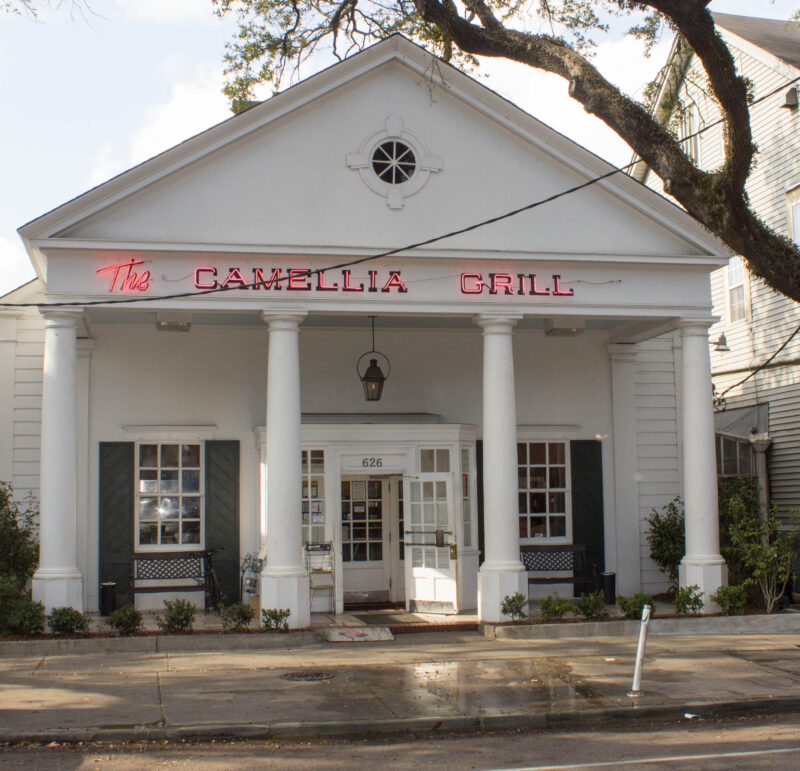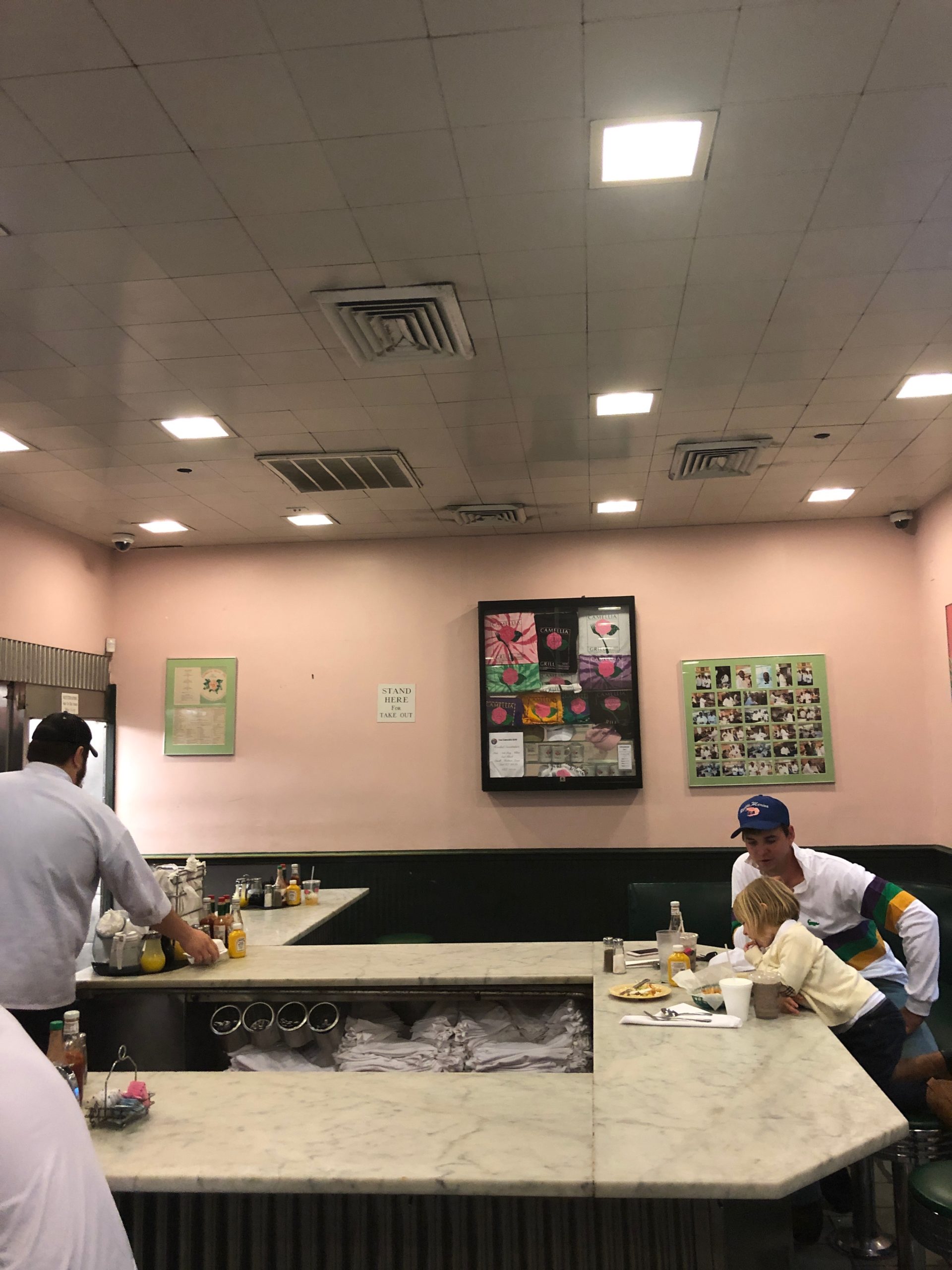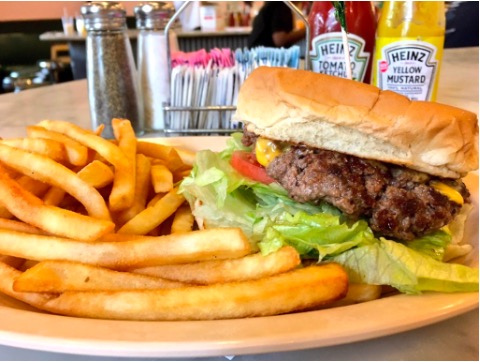
Camellia Grill (Photo: Dan Soto; Wikimedia)
When you search “Camellia Grill” on Google, its website pops up, brandished with the slogan, “The Most Famous Diner in NOLA.” This claim doesn’t come without merit – official New Orleans tourist websites and independently-run restaurant review sites seem to agree that the Camellia Grill is a must-try for locals and tourists alike. However, if you are searching for a quiet and quaint Sunday morning brunch, Camellia Grill is not the place to go. Upon walking in the white double doors of the picturesque building on the corner of Carrollton and Saint Charles, the sounds of forks scraping against plates, bacon sizzling on the stovetop, line cooks yelling orders at one another, and customers merrily carrying on their conversations fill the room.

Inside Camellia Grill (Photo by: Jake Rush)
Camellia Grill’s winding, W-shaped lunch counter offers customers a premium view of the diner’s line cooks, who in turn, get to see their customers. The kitchen staff laughs along as an elderly couple fanning themselves with church bulletins make small talk with a group of boisterous young boys who reek of freshly smoked weed, all bonding over their mutual amusement at the tourist family sitting across from them, laughing with each other as they watch the young son and his dad fight over who gets to take the last spoonful of gumbo.
In an article published by the Journal of Retail & Leisure Property, researchers AbelDuarte Alonso and Martin O’Neill investigate the effects that an open-kitchen restaurant like Camellia Grill has on the consumer’s perception of their dining experience. The research consisted of a qualitative questionnaire distributed to 275 participants across different demographic groups. The survey concluded that an open kitchen design often leads patrons to positive associations regarding the staff’s affability, business transparency, and a sense of community within the restaurant.
As our waiter approached our end of the lunch counter, my roommate struggled to decide what she wanted to order. Instead of brushing her off and moving to the next customers, our waiter turned to my roommate with a wry smile and said, “Don’t worry hon, we’ll get through this together.” Upon helping her come to a final decision, he hollered our orders back to the line cooks before seamlessly transitioning to the young boys sitting next to us.
The waitstaff at Camellia Grill is the perfect combination of friendly and straight to the point; polite yet ready to get the job done. Overwhelmingly, participants of Alonso and O’Neill’s research survey cited the entertainment value of witnessing chefs cooking a meal as a benefit to their dining experience. Watching along as the chefs flipped my hamburger and scrambled my roommate’s eggs, I became all the more excited to devour my meal. Another major benefit provided by the presence of an open kitchen is what Alonso and O’Neill refer to simply as the “feel-good” factor: a feeling of belonging and community in an otherwise unfamiliar location, allowing the customer to feel at ease in the space they are occupying. This “feel-good” factor, when paired with a laid-back ambiance, like Camellia Grill’s open-seating plan and friendly customer service, leads to a heightened sense of customer satisfaction; and as such, it is no wonder that every stool is occupied along Camellia Grill’s winding counter.

Camellia Grill’s Classic Cheese Burger (Kristine Froeba); Google Images
After eagerly watching each step in the preparation of my food, a simple cheeseburger with french fries, our waiter plopped my plate down in front of me. It was objectively not anything to call home about – a single slice of Kraft American cheese sat atop the burger, un-melted, the lettuce was wilted, and the hamburger’s grease seeped into the bun, leaving a soggy bottom bun that made the burger difficult to hold. The French fries were bland on their own, demanding assistance from a hefty sprinkle of Tony Chachere’s. So why is it that I viewed this otherwise average meal as a special, delicious treat?
In an article published in The Atlantic entitled “American Nostalgia in a Bun,” writer Suzy Swartz states, “Though identifying one national comfort food in a country as heterogeneous as the United States would be ahistorical bordering on irresponsible, the most enduring icon of American cuisine is the diner or local fast-food franchise, purveyors of…the burger, shake, and fries.” The hamburger has been engrained into the essential American experience through its association with fast food, an industry that experienced its rapid ascendancy during the post-war twentieth century, a time of strife with national pride, emphasis on efficiency, and belief in American exceptionalism. The phrase “comfort food” first appeared in the modern American lexicon around the same time as the fast food and diner food industry boom, describing foods that satiate one’s emotional needs in addition to the innate physiological need for sustenance. According to a study published by Jordan D. Troisi and Shira Gabriel in the journal Appetite, this concept of “comfort food” has both significant and consequential psychological implications that can be understood by investigating its impact on feelings of loneliness, concluding that comfort foods suggest a sense of belongingness and attachment to others.
Despite its lively, ever-changing environment, Camellia Grill provides comfort to its guests through its classic diner-style food and service. From its simple hamburger-and-fries combo meal to its kitchen-front dining setup, the establishment harkens back to the nostalgia-filled diner culture of the mid-twentieth century. Whether you are just coming from a Sunday church service, arriving after a smoke session, or taking a New Orleans tour guide’s advice for a comforting local meal, you will find a seat waiting for you in Camellia Grill.
This piece was edited by Emma Carter as part of Professor Kelley Crawford’s Digital Civic Engagement course at Tulane University.
 NOLAbeings Multimedia artist Claire Bangser created NOLAbeings as a portrait-based story project that marries...
NOLAbeings Multimedia artist Claire Bangser created NOLAbeings as a portrait-based story project that marries...  Voodoo in New Orleans: Reviving history: New Orleans fortune telling This article takes a deep dive into the history of Voodoo in New Orleans, its hybridization with Catholicism, and its present-day place in the city's culture. The author visits fortune-tellers in the French Quarter, using their guidance as a tool for introspection rather than a deterministic predictor of the future. Through her experiences in New Orleans, the author feels a mystical connection to both the past and the future.
Voodoo in New Orleans: Reviving history: New Orleans fortune telling This article takes a deep dive into the history of Voodoo in New Orleans, its hybridization with Catholicism, and its present-day place in the city's culture. The author visits fortune-tellers in the French Quarter, using their guidance as a tool for introspection rather than a deterministic predictor of the future. Through her experiences in New Orleans, the author feels a mystical connection to both the past and the future. 